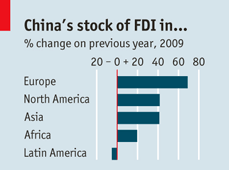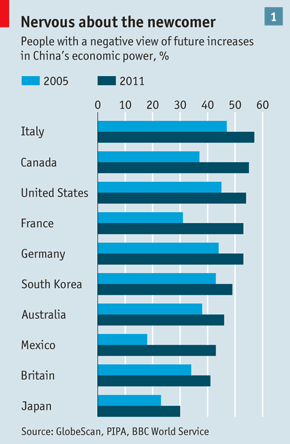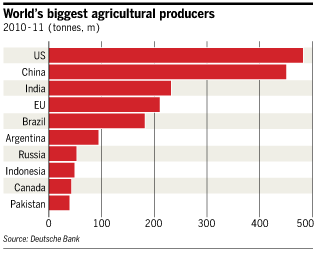Having already offered a methodological take on what transpired in the grand strategy portion (Week 3) of Wikistrat’s International Grand Strategy Competition, I wanted to offer this additional “greatest hits” compilation from the week’s entries. Here are the top 12 nuggets:
1) A “zero problems in Eurasia” foreign policy that allows the European Union to competitively market its junior partner services to Leviathans other than the US (EU2/Oxford). This is such a bold repositioning of Europe that I chose to write it up as my next-Monday World Politics Review column. If you really believe you’re in a multi-polar world but can’t compete for one of the superpower slots, this is where visionary realism takes you.
2) In a multi-polar system, the US needs to position itself as the “keystone” (US3/Johns Hopkins University). Best use of a definition, pulling from Merriam-Webster:
Keystone : the wedge-shaped piece at the crown of an arch that locks the other pieces in place; something on which associated things depend for support; a species of plant or animal that produces a major impact (as by predation) on its ecosystem and is considered essential to maintaining optimum ecosystem function or structure.
The imagery is fabulous: the US as the piece that “locks the other pieces in place,” the source of “support” (biggest provider of aid) and the policing/“predation” role that maintains (when done well, mind you) “optimum ecosystem function or structure.” This would serve as a brilliant opening slide in PPT presentation, because its bit rate on vision transmission is so high.
3) Better for Turkey to be a big fish in a small pond (EU-like entity it builds in Mideast) than a small unwanted fish in a bigger pond (Turkey3/Institute for World Politics 1). The supporting logic was just as solid: Turkey is well positioned to “win” the Arab Spring, in part because its leadership offering is more palatable to more players than that of Iran’s or Saudi Arabia’s. So why not take advantage of the overall US withdrawal and avoid the anti-Muslim backlash in Europe?
4) If you don’t like your current storyline, change it (Russia2/New York University). One of the very best articulated Objectives:
Russia suffers from an antiquated global ideology that reached the zenith of soft power attraction in the 1950s and has since steadily and rapidly declined. Both domestically and internationally, the image of Russia as a pessimistic nation that lost the major ideological struggle of the 20th century impedes its potential to hold and grow great power status in the future. As a whole, the modified Russian great power narrative should fall under the motto, ‘Strong Russia, Strong World.’ In other words, Russia needs to reposition itself as a critical part of global stability in the 21st century.
The press can only use what you give it.
5) If you’re falling behind the race, considering tripping the competition (Pakistan1/Claremont Graduate University).
Covert Sub-Strategy: Pakistan will utilize its diplomatic and covert resources to forestall the development of alternative Central Asian pipelines. This involves isolating Iran and using Afghanistan to do it.
Covert should be all about nasty, and this qualifies. You also have to marvel at the bit-rate transmission here: concise clear language that conveys a lot of strategic logic.
6) Nukes are for having, and being respected for having (North Korea2/Sussex). Yes, the first order of business is regime survival, but once you’ve shut down the easy regime-change option, you want to get your money’s worth. Having nukes means you’re in the big-boys’ club, but only if you’re accepted as such. So once the vertical proliferation is completed, it’s time to go for the horizontal recognition.
7) Japan as globalization’s high-tech answer man (Japan1/University of Kentucky). Because Japan is a resource-dependent island nation, it had to turn toward globalization a long time ago to facilitate its rise. It has learned plenty along the way but does not get credit for that wisdom, in part because it sells itself weakly abroad and because it has recently suffered a number of image-crunching disasters. Time to turn that world-class resilience into a marketable strategic good.
8) If the current roster of great powers isn’t making regional stability happen, socialize the problem further (Israel3/Tel Aviv University). The Middle East’s current connectivity with outside great powers (i.e., the West) just isn’t doing it. Israel is a super-globalized economy, so why not put that connectivity to strategic use by encouraging as many rising great powers into the region as possible? More entrants = more strategic interests = bigger collective outside push by great powers for regional stability. Suffer the details and inevitable setbacks, yes, but the strategic logic is sound. As a grand strategy, it doesn’t get any more concise.
9) If China is to be THE global superpower of mid-century, it has to project norms and values of universal appeal (China3/University of London). Simultaneously good advice and sharp analysis: China’s global rise as a single-party state is self-limiting, unless it can evolve. Notice how nobody talks about the “Beijing Consensus” since the Arab Spring began?
10) If Africa is ground zero of globalization’s current integration process, then providing the best model for those countries is a strategic competition worth winning (Brazil1/Institute for World Politics 2). With its multicultural background and ability to mix raw material exports with high-tech goods and agricultural production, Brazil is the best model for Africa as it moves up economically – not India or China.
11) There’s nothing wrong about playing for second place (European Union2/Oxford & India2/Institute of Peace and Conflict Studies). Why exhaust yourself in the coming Sino-American duel when there are plenty of good niches to exploit (EU) or if you’re betting on your long-term demographic dividend to vault you into first place later in the century (India)?
12) Seeking regional hegemony as a defensive posture (Iran2/University of Cambridge). An eye-opening analysis of Iran’s #1 Objective:
The main driver behind this goal is Iran’s perception of its own isolation and its feeling of encirclement within the region. Iran does not seek power as an end per se, but it views regional hegemony as the only true guarantee of its long-term security, and all its other policy objectives can be regarded as instrumental to this. Iran’s bid for hegemony should also not be confused with a form of revisionist expansionism. In fact, it is perhaps best viewed through the lenses of defensive realism.
For those of us who like to spot in Iran’s revolutionary failures/stagnation a loose rerun of the Soviet decline, this perspective adds plenty.
 Monday, July 11, 2011 at 10:13AM
Monday, July 11, 2011 at 10:13AM Mark Thompson picks up on Chins's cheeky advice to visiting Chairman of the Joint Chiefs Admiral Mike Mullen regarding our coupling of world-class defense spending with our world-class national debt/faltering economy. We can brush it aside, of course, seeing that it's coming from our #1 excuse for defense spending (Mustn't let those Chinese . . . ).



 China,
China,  FDI,
FDI,  US Military,
US Military,  US foreign policy | in
US foreign policy | in  Time's Battleland |
Time's Battleland |  Email Article |
Email Article |  Permalink |
Permalink |  Print Article
Print Article 










 Opportunities
Opportunities Risks
Risks Dependencies
Dependencies








